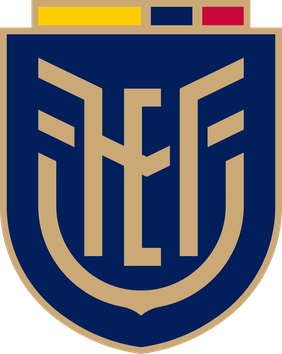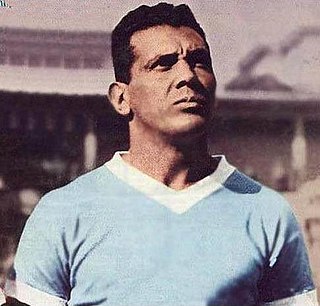Related Research Articles

Guillermo Gorostiza Paredes was a Spanish footballer who played as a forward.

The Hungary national football team represents Hungary in men's international football, and is controlled by the Hungarian Football Federation. The team has made nine appearances in the FIFA World Cup, and five in the UEFA European Championship. Hungary plays their home matches at the Puskás Aréna, in Budapest, which opened in November 2019.

The Peru national football team represents Peru in men's international football. The national team has been organised, since 1927, by the Peruvian Football Federation (FPF). The FPF constitutes one of the ten members of FIFA's South American Football Confederation (CONMEBOL). Peru has won the Copa América twice, and has qualified for the FIFA World Cup five times ; the team also participated in the 1936 Olympic football competition and has reached the semi-finals of the CONCACAF Gold Cup. The team plays most of its home matches at the Estadio Nacional in Lima, the country's capital.

The Bolivia national football team, also known as La Verde, has represented Bolivia in international football since 1926. Organized by the Bolivian Football Federation (FBF), it is one of the ten members of FIFA's South American Football Confederation (CONMEBOL).

The Ecuador national football team represents Ecuador in men's international football and is controlled by the Ecuadorian Football Federation (FEF). They joined FIFA in 1926 and CONMEBOL a year later.
George Hedley Swindin was an English football player and manager.
The Basque Country national football team represents the Basque Country in football. It selects players from the Basque Country autonomous community, Navarre and the French Basque Country and is organised by the Basque Football Federation. It is not affiliated with FIFA or UEFA and therefore only allowed to play friendly matches against FIFA or non-FIFA affiliated teams.

Obdulio Jacinto Muiños Varela was a Uruguayan football player. He was the captain of the Uruguay national team that won the 1950 World Cup after beating Brazil in the decisive final round match popularly known as the Maracanazo. He was nicknamed "El Negro Jefe" because of his dark skin and the influence he had on the pitch, especially during the unlikely victory over Brazil. He was of African, Spanish and Greek ancestry. Commonly regarded as one of the greatest classic holding midfielders, Varela was adept in defence and was renowned for his tenacity and leadership. He is regarded as one of the greatest captains in football history, and "he remains one of the biggest sporting heroes in Uruguay".

Teodoro "Lolo" Fernández Meyzán was a Peruvian professional footballer who played as forward. All his football work was carried out as a player of the Universitario de Deportes of the Peruvian First Division. He was champion, best player and top scorer in the 1939 Copa América. He is the top idol of Universitario de Deportes and Peruvian First Division.
Edward Weir was an Irish footballer who played for several clubs in the Scottish Football League. He was also a dual Irish international and played for both Ireland teams – the IFA XI and the FAI XI. After retiring as a player he managed Dundalk.
Idris Morgan Hopkins was a Welsh footballer famed for his talented right foot. He played for many clubs throughout his career, but most famously Brentford where he captained them in the English First Division. He is a member of the Brentford Hall of Fame.
David "Dai" Jenkins initially played Rugby Union. He changed codes when he was 21 and played Rugby League between 1935-1957, mainly for Leeds Rugby League Club as a scrum-half.
Conyers Kirby, also known as Ralph Kirby, was an English professional footballer who played in the Football League for Birmingham. He played as an outside right.

This page is a list of all the matches that Portugal national football team has played between 1921 and 1939. Between their first match in 1921 and 1939, when competitive football stopped because of the Second World War, Portugal played in 42 matches, resulting in 13 victories, 7 draws, 22 defeats. Throughout this period they played in the 1928 Olympics, reaching the quarter-finals where they got knocked out by Egypt.

The Wales national football team represents Wales in international association football and is governed by the Football Association of Wales (FAW). Between 1920 and 1939 the side played 62 matches, the majority against the other national teams of the Home Nations in the British Home Championship. The side played their first official match after the end of World War I in February 1920 on the resumption of the Home Championship, drawing 2–2 with Ireland. A draw with Scotland and a win over England, their first since 1882, in the 1919–20 tournament secured the second Home Championship in Wales' history. They won a third title in the 1923–24 British Home Championship after defeating all three opponents in the same competition for the first time.

Arthur Tuur Albert Ceuleers was a Belgian footballer. A striker for Beerschot VAC, he was twice Champion of Belgium in 1938 and 1939.

Alfred Quill was an Australian soccer player and played for the Australia national team. Often considered one of the best soccer players in New South Wales, he scored 868 goals in all NSW competitions in his 24-year senior career.

Club Deportivo Euzkadi was an association football team that played in the Primera Fuerza league in Mexico during the 1938–39 season. It was formed when the Basque Country national football team, which had been touring the world, was refused permission by the world governing body of association football FIFA, to play any more FIFA affiliated teams due to political issues arising from the ongoing Spanish Civil War. As a result of this ruling the team decided to stay in Mexico and participate in the Mexican domestic league under the name Club Deportivo Euzkadi, a move which FIFA allowed.
This is a list of results for the matches played by the Basque Country national football team, including unofficial friendly fixtures against full FIFA international teams, others against fellow representative teams which are not aligned to FIFA, and matches against professional clubs.
Manuel Meana was a Spanish footballer. He was capped for Spain 7 times and was part of Spain's squad for the football tournament at the 1924 Summer Olympics, but he did not play in any matches. Under the presidency of Santiago Bernabéu he was the creator and first director of the Real Madrid Sports City, a position he held until his retirement.
References
- ↑ "El histórico unico gol de Green, el primer galés en la Liga". AS.com (in Spanish). 25 February 2017. Retrieved 4 August 2021.
- ↑ "Wales player database 1872 to 2013". eu-football.info. Retrieved 30 April 2016.
